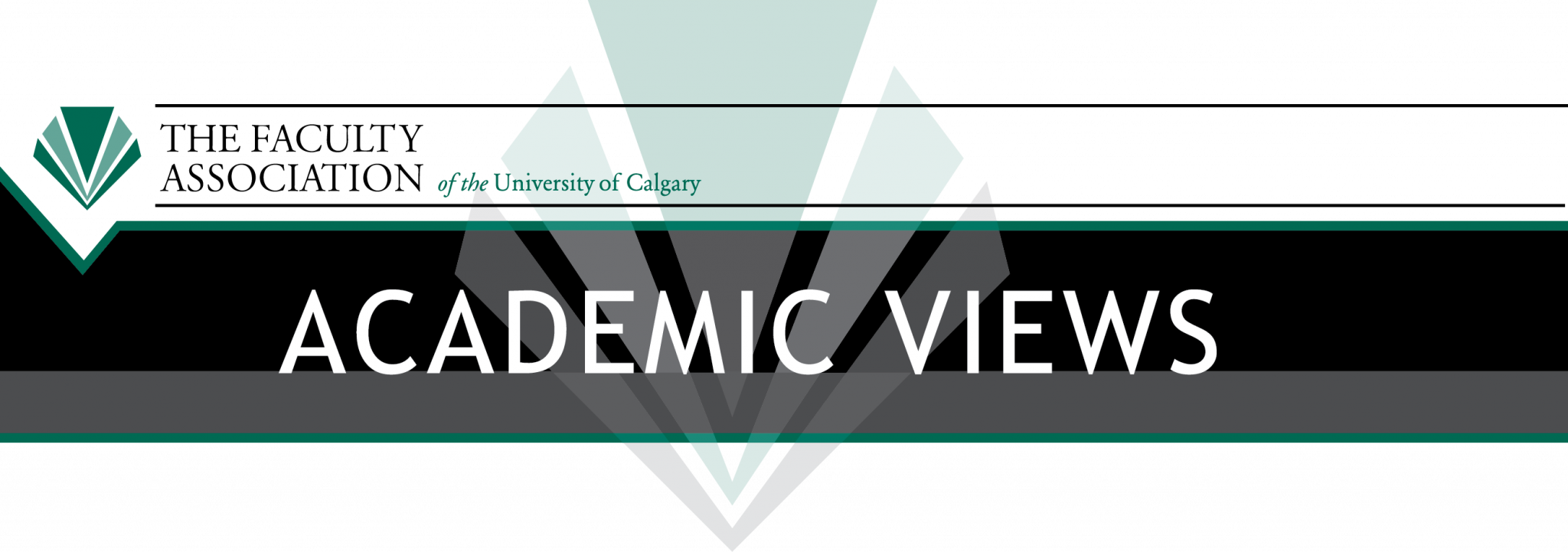
The Faculty Association heads into negotiations for a new Collective Agreement in the New Year. The Bargaining Team includes Hamid Habibi as Principal Negotiator, Trevor Tombe, Sheila Miller, and Don Kozak (resource person). As negotiations approach, the Bargaining Team has been busy gathering ideas and information from Department Representatives and the broader membership with a bargaining survey that closed on December 8th.
Thank you to everyone who participated in the survey. Response to the bargaining survey received 619 responses from ongoing members and 120 responses from sessional members. The Bargaining Team continues to work through the responses, but it’s clear that there is a lot of dissatisfaction among members. Members are frustrated with ever-increasing workload demands while compensation hasn’t kept up with the rising cost of living or colleagues at other Universities.
The frustration expressed by members in the bargaining survey are supported by data that is widely available to the public through Statistics Canada, Canadian Association of University Business Officers (CAUBO), and the University’s Office of Institutional Analysis (OIA), which we will discuss briefly below.
Increasing teaching workload
Teaching workload, one component of the overall workload for academic staff, has been increasing and is set to continue to increase over the next several years. According to the OIA, undergraduate student enrolment increased from 25,783 to 28,328 (+9.9%) between Fall 2012 and Fall 2022 while graduate student enrolment increased from 6,017 to 8,003 (+33%) over the same period. Meanwhile, according the OIA, ongoing academic staff increased from 1785 Full-Time Equivalents (FTE) to 1841 FTE (+3.1%) between 2012 and 2022. In other words, the number of ongoing academic staff has not grown to keep pace with rising enrolment. According to the Ahead of Tomorrow strategic plan, we can expect total enrolment to increase by 10,000 and graduate enrolment to increase by 7,000 by 2030, while striving to become the #1 university for student engagement in the U15. The plan suggests students will benefit from the University’s embracing of new technologies and new discoveries to support innovation in teaching and learning, but it neglects to mention the clear need for more academic staff to teach these students.
Eyes High; Salaries Low
In 2011, President Elizabeth Cannon launched the Eyes High strategic vision for the University of Calgary with a goal of being recognized as one of Canada’s top-five research universities. About a decade later in January 2022, President Ed McCauley announced that the University had achieved this key goal with sponsored research passing $457 million in 2019-2020 and continuing to grow. According to the press release at the time, this represented an impressive 167 per cent growth in sponsored research since 2001-2002.
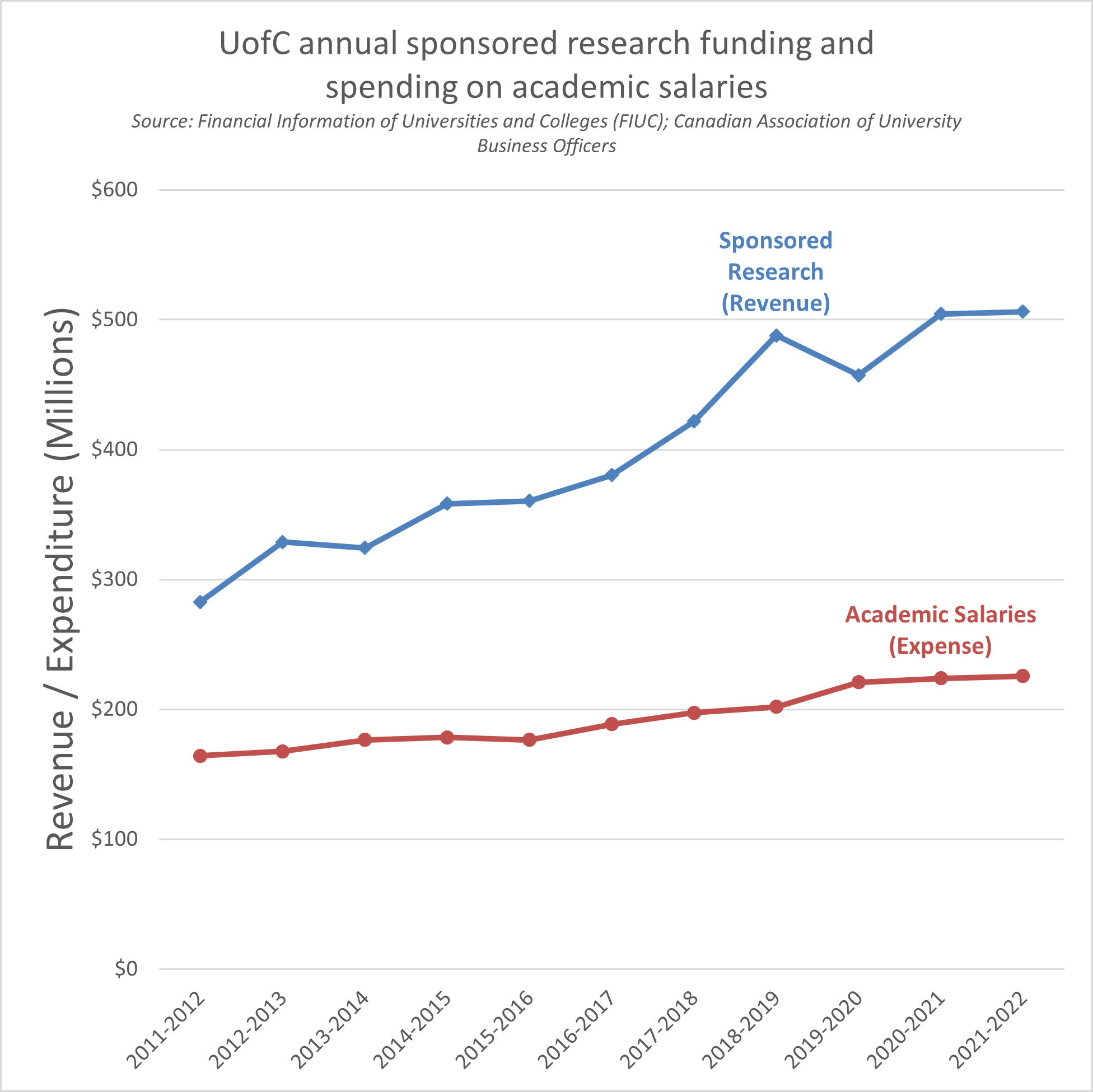
Based on the University’s financial reporting to CAUBO, annual funding for sponsored research increased by 79 per cent between 2011-2012 and 2021-2022. This impressive increase in research funding could not have been achieved without the hard work and dedication of the academic staff, but the spending on academic salaries only increased by 37 per cent between 2011-2012 and 2021-2022.
Academic salaries at the University of Calgary have not kept up with inflation
While there have been nominal increases in the average salary of academic staff at the University of Calgary, inflation has reduced the purchasing power over time such that members have effectively experienced wage cuts over the last ten years. When adjusted using average annual inflation, the purchasing power of average academic salaries at the University of Calgary decreased by about 11 per cent from 2012-2013 to 2022-2023 and is approaching 2006-2007 levels.
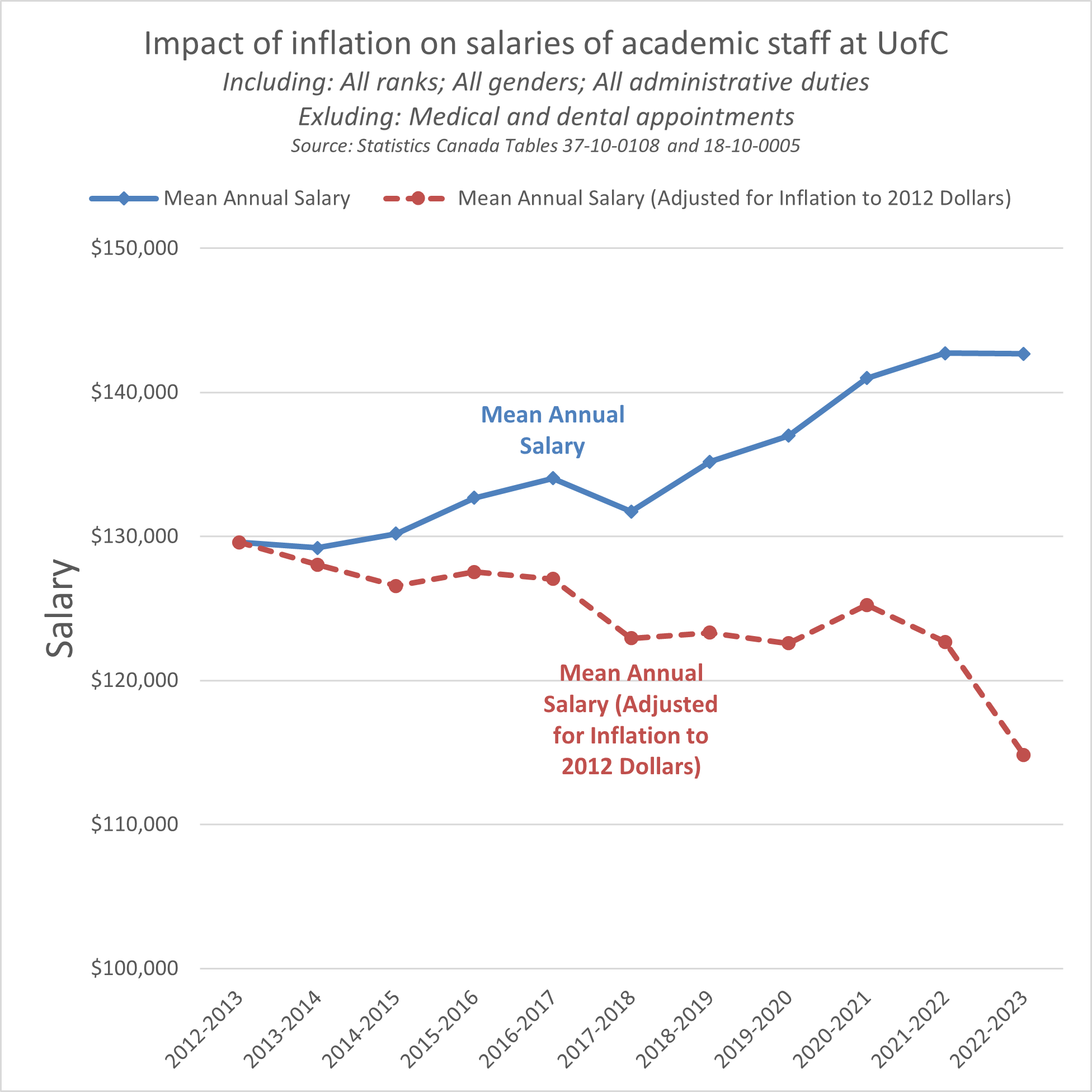
Academic salaries at the University of Calgary have not kept up with U15
Without considering the impact of inflation, the average salary of academic staff at the University of Calgary has not kept pace with comparators in the U15 Group of Canadian Research Universities. According to Statistics Canada salary data released in November 2023, the University of Calgary is currently the third lowest in the U15. This is a significant decline – in 2010, the University of Calgary was in sixth spot.
As of 2022-2023, the average salary of academic staff at the University of Calgary would need to increase by at least 15 per cent to join the University of Alberta in the middle of the U15.
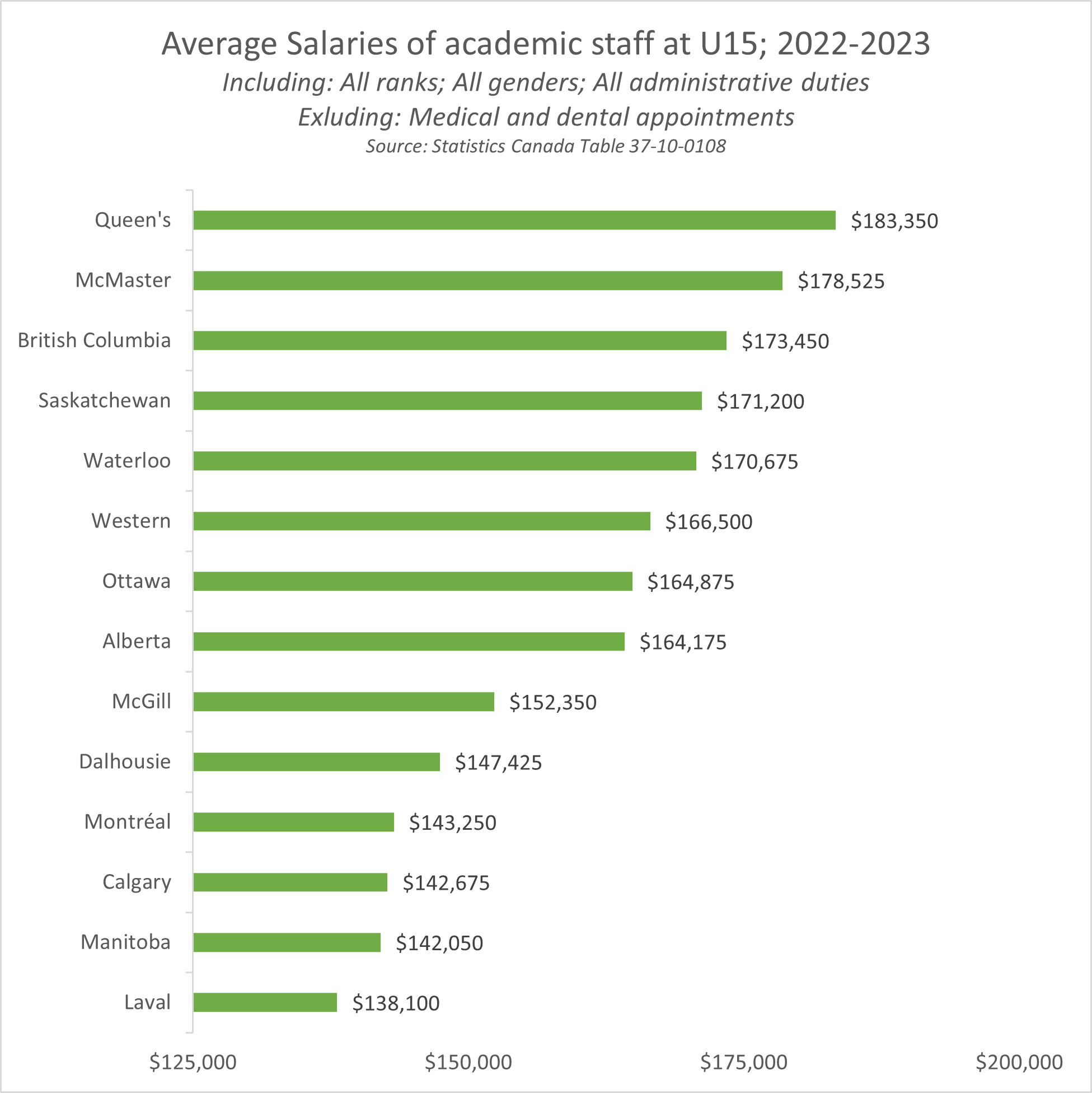
Note: 2022-2023 salaries for the University of Toronto were not available at the time of this analysis. However, the University of Toronto is consistently among the top two.
Academic salaries at the University of Calgary have not kept up with the University of Alberta
For much of the history of the University of Calgary, the average salary of academic staff was within a couple thousand dollars of the average salary at the University of Alberta. However, the gap widened in the 1990s and exploded in the 2010s under the leadership of Elizabeth Cannon and Dru Marshall.
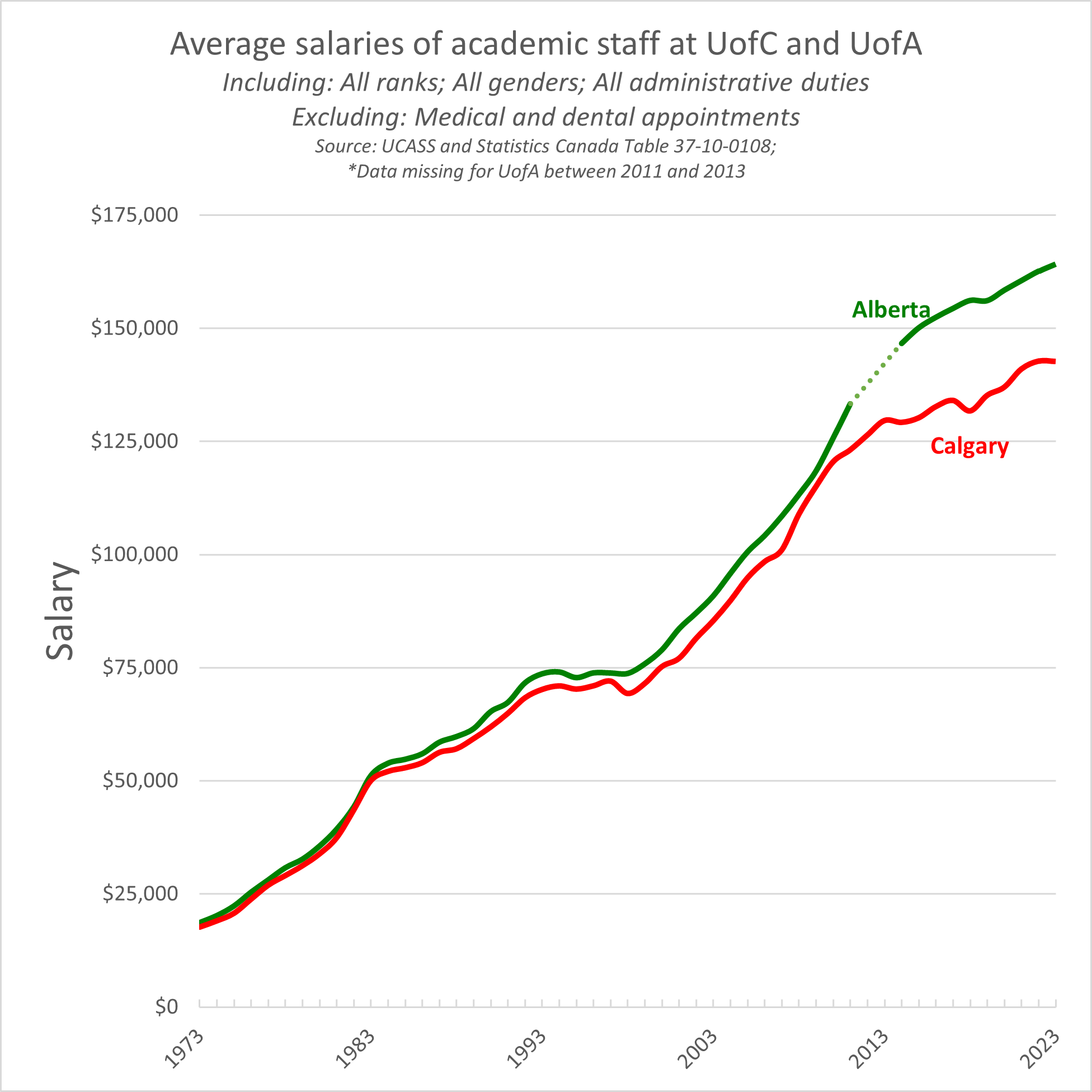
Note: UofA data missing between 2011 and 2013)
During the wage reopener arbitration in 2019, not only did the Administration seek a two per cent wage roll back, but the Administration argued in their submission that the salaries of academic staff at the University of Calgary should not be compared with the salaries of academic staff at the University of Alberta;
Although the University of Alberta is a main comparator and the institution used by TUCFA to justify its proposal, the University [of Calgary] will demonstrate that the University of Alberta is a distinguishable institution (compared to the University [of Calgary]), and also, that the University [of Calgary] and the University of Alberta have no history of matching ATB salary settlements.
This was a curious argument given that the University of Calgary had spent the previous several years with the main goal of being one of Canada’s top 5 research universities and at the time was neck and neck with the University of Alberta for the coveted top 5 spot according to Re$earch Infosource Inc.’s Canada’s Top 50 Research Universities for 2019. In addition, the University of Calgary research intensity of $271,600 per faculty member compared favourably to the University of Alberta’s $235,900 per faculty member.
Academic staff deserve better
There is a consistent pattern. The academic staff of the University of Calgary have met the challenges of increased student enrolment and raised the standards of research excellence. At the same time, the Governors and the Administration have failed to respond in kind by maintaining the competitiveness in compensation to academic staff. While pressing academics to be the best in the country, they have been driving us to the bottom.
This winter, our Bargaining Team will be pressing the Governors to stop the drive to the bottom, to provide the resources to address the workload crisis across campus, to address the issues of recruitment and retention due to uncompetitive salaries, and to fairly reward academic staff for all their efforts.
